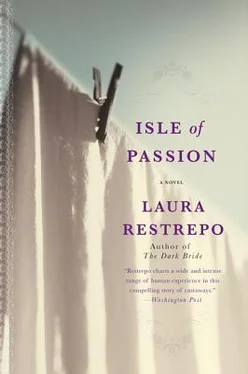The Friday festivities became a ritual, religiously observed even on the day a hurricane plucked the Pianola from its corner and smacked it against the rocks, and made the mandolin spin together with the coconuts, the chickens, and some chunks of wood, finally leaving it floating on the ocean.
But that was later. Now, and contrary to Ramón’s fears, his wife looked happier every day. Not because of the evening gatherings. What had happened, thanks to the rains, was that Alicia found herself in a world of ideal solitude, meticulously shared with Ramón within the complicity of the four walls of their home. In the midst of all their deprivations, Clipperton allowed something Orizaba would surely have denied them: the opportunity of becoming great friends and lovers.
In Clipperton they had the time and intimacy necessary to master the art of making love to each other, and after many failures and misunderstandings, they deciphered the exact science of mutual pleasure. They managed together to temper the chaos of their impulses to the rhythm of their hearts, softened their granite morals, got used to their nakedness, became more skilled and less timid, prayed less and laughed more. “Oh Lord, don’t allow me to enjoy this! Oh Lord, please, don’t allow me to enjoy this,” Alicia uselessly prayed when she felt an electric, inevitable wave of happiness that jolted her body.
Protected by the thick curtains of rainfall, they celebrated the daily lovemaking ritual in a postcard atmosphere, in the hammock of the western balcony, bathed in the golden reflections of many sunsets.
The lack of supplies — due to the delay in the arrival of the ship — imposed on their bodies physical transformations that exerted a favorable influence on this burst of passion. One of the first items that ran out in Clipperton was brilliantine, which forced Ramón to forgo the rigid coif that made him look like a ventriloquist’s doll and set free his thin, stiff mustache, which became thick and sensual. Besides, far away from the imperial banquets Doña Carlota had served him, his double chin disappeared as well as the incipient belly that was starting to give him a rounded figure.
For her part, Alicia ran out of rice talcum powder, and once she stopped using it, her translucent doll-like complexion took on a more human texture. She abandoned the mannequin stiffness, the rigidity of the corset and the crinolines, and her dainty silhouette recovered the childlike elasticity she had left behind in the hills of Orizaba. She lost one by one all of her hairpins until she had to renounce her old-fashioned tight buns and let her hair loose and free like a lion’s mane.
The hot sun of the preceding months had changed the ghostly paleness of their bodies into a healthier-looking tan. And once they used up the last drop of milk of magnesia, which applied to their underarms sweetened the humors of their armpits, they discovered the attraction of their natural animal odors.
This was also the time that Alicia remembered later as the happiest of her life, when she and Ramón engaged day after day in an interminable conversation, continued compulsively for many years. Not even Ramón’s death interrupted it, since Alicia would repeat it afterward all by herself, saying her part of the dialogue and repeating the answers that he had given her, which she knew by heart.
In this infinite dialogue that coiled upon itself like a snake, or a figure eight, they used to recite with all the inflections, all the intense feelings, all the upsets, the reasons and demands of their love, in counterpoint or in a duet. They made an inventory of all the good and all the bad traits of each and every person they knew; they would draw and erase future projects; they reviewed the commonplace and probed the transcendental; they evaluated past and present moments of their lives in this world and confessed to each other their fears and expectations about the one beyond.
Sometimes, in the middle of the lull brought by an afternoon downpour, any careless remark could trigger a conjugal fight. As when Alicia commented that Doña Carlota had wasted the Arnaud fortune, or when Ramón suggested that Don Félix Rovira was a domineering, possessive father. Then they stopped holding hands, and heatedly released an angry stream of words that would take them, without their knowing exactly when, to a point at which, viciously trying to hurt, they screamed their imperfections at each other, showing the animosity of two fighting cocks. Invariably, it all ended with an explosion of accumulated and festering pockets of jealousy that each of them had stored, without ever admitting it, in some corner of their livers.
Ramón accused her of swooning over Lieutenant Cardona’s singing on Friday evenings.
“Do you think I don’t notice that you prefer to dance the polkas with him?” he asked her with an indignation befitting someone who is demanding an explanation from his aged mother’s murderer.
Alicia swore to God that it wasn’t true, saying she recognized that Cardona did indeed sing and dance like an angel, but that did not mean anything. Ramón was the only man in her life, she purred, cuddling next to him, soft and loving like a cat, and suddenly, if Ramón was still offended and indifferent, the kitten became a tigress. Her eyes shone with rage, and she practically spit her words through clenched teeth.
“And what about you and that good-for-nothing Pinzón woman?”—she was referring to Schultz’s lover—“Why can’t you take your eyes off her bottom when she stops by the infirmary to meet with you alone, on the ridiculous pretext of asking you for a remedy for her headaches?”
“It is no pretext, the poor woman suffers from terrible migraines, and besides, her ass does not interest me,” Ramón countered. He was playing kitten now, and Alicia was the one showing indifference.
And in this way the perfect harmony they had achieved before their argument was crushed to smithereens, and their eternal love was scattered on the floor, their lives destroyed, riddled with discontent. Alicia ran to the bedroom to cry her eyes out, and Ramón locked himself up in his office. When they grew tired of ruminating in spite and of flagellating themselves with jealousy, when their anger came down like the foam of boiling milk after it is removed from the fire, they found some excuse to meet again, to embrace with the absolute happiness of reconciliation, and without more ado, without transitions or logical reasoning, order was restored, and their hurt feelings disappeared somewhere as if they had never existed, and everything returned to the way it was before.
As a reminder of their tragic moments, there were Alicia’s swollen eyelids, which Ramón tended to by applying tea compresses. Life went on until another placid afternoon, a few weeks later, when a loose comment would again trigger a conjugal fight, copious like the rain, and thus fulfill its decisive and definite function of restoring their faded emotions and sparkling their dialogue, which was so endless that otherwise it would have to repeat itself like the piano roll of “White Kitten” in her Pianola.
The effect of so much isolation was soon felt. The calendar became a useless object in the unchanging Clipperton time, and for Alicia the notion of dates had dissipated. Monday was the same as Thursday or Sunday, and there was no difference between September and October or November. At the beginning of December, however, she realized that for a long time she had not needed to wash the linen used for her menstrual flow, and when she looked at herself in the mirror, she saw that her waist was gone.
News of the pregnancy made Ramón unreasonably anxious about the delay, already incomprehensible by then, in the arrival of the ship. December marked the fourth month since they had been forsaken on the isle, and there was no excuse for this. It was in blatant disagreement with any arrangement made. The rains had eroded the garden soil, and the shortage of greens and citrus fruit began to be felt. He was afraid they would all soon be suffering from a terrible disease, the one that attacked seamen and shipwrecked sailors, and about which he had informed himself in the medical books: scurvy. He did not want to cause panic needlessly, and he did not say a word about it, but while he spoke with anyone, he surreptitiously tried to take a look at their gums to see if they were blackened, which would be the first signal.
Читать дальше












